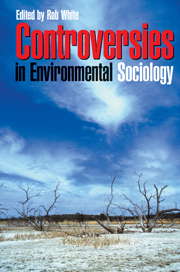Book contents
- Frontmatter
- Contents
- Tables and Figures
- Author Notes
- Abbreviations
- Introduction: Sociology, Society and the Environment
- PART I SOCIAL PERSPECTIVES
- 1 Old Traditions and New Ages: Religions and Environments
- 2 Social Nature
- 3 Gender, Eco-Feminism and the Environment
- 4 Animals, ‘Nature’ and Human Interests
- 5 Governing Environmental Harms in a Risk Society
- PART II SOCIAL TRENDS
- PART III SOCIAL ISSUES
- Index
- References
3 - Gender, Eco-Feminism and the Environment
Published online by Cambridge University Press: 05 June 2012
- Frontmatter
- Contents
- Tables and Figures
- Author Notes
- Abbreviations
- Introduction: Sociology, Society and the Environment
- PART I SOCIAL PERSPECTIVES
- 1 Old Traditions and New Ages: Religions and Environments
- 2 Social Nature
- 3 Gender, Eco-Feminism and the Environment
- 4 Animals, ‘Nature’ and Human Interests
- 5 Governing Environmental Harms in a Risk Society
- PART II SOCIAL TRENDS
- PART III SOCIAL ISSUES
- Index
- References
Summary
Eco-feminism has several major aims. One project is to connect feminist and ecological perspectives, thought and movements, developing ‘a feminism that is ecological and an ecology that is feminist’, in Ynestra King's (1989) words. Eco-feminist thinking grew from criticism of sexism in the green movement and lack of ecological consciousness in the women's movement into a critique opposing all forms of oppression. Eco-feminist thinkers have also explored conceptual and cultural connections between women and nature, and applied feminist power analyses to problems in environmental philosophy.
Much feminist and eco-feminist philosophical critique has focused on mind/body dualism and the denial of embodiment as the key background for the environmental failure of Western culture. Early eco-feminism challenged dualised conceptions of spirit as transcendent male deity and developed alternative eco-feminist philosophies and spiritualities of embodiment and immanence (Ruether 1975; King 1981; Spretnak 1982). Contemporary ecological feminism often draws on an analysis of mind/body, spirit/matter and male/female dualisms or deep conceptual splits to understand the contribution of gender to the forms of culture and economic rationality that bring contemporary societies into ecological danger zones – the ecological crisis.
BACKGROUND TO THE ISSUES
Eco-feminist historical scholars Rosemary Ruether (1975) and Carolyn Merchant (1980) and others established major conceptual connections between women and nature in Western culture. Women in this culture have been historically associated with the supposedly ‘lower’ order of nature, with animality, materiality and physicality, and men with the contrasting ‘higher’ order of mind, reason and culture.
- Type
- Chapter
- Information
- Controversies in Environmental Sociology , pp. 43 - 60Publisher: Cambridge University PressPrint publication year: 2004
References
- 29
- Cited by



